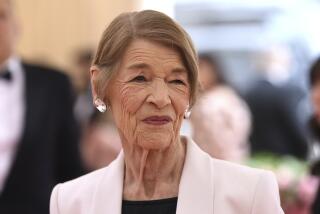Thatcher’s Legacy Keeps Its Iron Grip on Nation’s Politics
- Share via
LONDON — On the 20th anniversary of Margaret Thatcher’s election as this country’s first female prime minister, British politics still lives in her shadow.
Her last name forms an adjective in the Oxford English Dictionary that raises almost as many emotions today as it did during her divisive reign, even though her conservative ideology is more widely accepted.
The Conservative Party she led for 11 years is running away from its Thatcherite image, while Labor Prime Minister Tony Blair is considered the spiritual heir of Thatcherism. He not only picks and chooses from her economic policies but has frequently consulted the “Iron Lady” since the beginning of NATO’s war in Kosovo.
“Margaret Thatcher pushed the Tory party far to the right and along came Blair and stole the middle ground,” said historian Piers Brendon, keeper of the Thatcher papers at Cambridge University. “Blair is adopting many of the more moderate Tory policies.”
Thatcher was elected in 1979 and became the longest-serving prime minister in 20th century Britain. In that time, she overhauled Britain’s socialized and centralized economy, privatizing gas, electricity, telephones, trains and most companies owned by the state.
She delighted in breaking the power of labor unions and saw the resulting unemployment as a necessary adjustment for a healthy economy.
“Too many Britons felt they were discarded, like so much unwanted waste, by an economic policy that regarded the winding down of manufacturing industry and the tripling of unemployment as mere collateral damage in an otherwise just war,” the Guardian newspaper wrote in an editorial marking this week’s anniversary of her election.
But even the left-of-center Guardian conceded that Thatcher had earned her place in history.
“With her program of privatizations, she slimmed down a state which had become flabby and overstretched, reconciling Britain forever to the market,” it said. “She effected the change brutally, and with great pain, but it was a change we had to make.”
It is the pain that many Britons do not forgive, along with the cold and unflinching way she is perceived to have ruled, whether it was in leading the Falklands War or rejecting European integration.
A.N. Wilson, a columnist for the Evening Standard tabloid, wrote last week that he was not surprised to learn that Blair is consulting Thatcher on the war in Yugoslavia.
“Blair’s attitude throughout has been as blinkered and as bloodthirsty as the Lady herself in the height of her powers,” Wilson said. “Typically Thatcherite is the suggestion in any given situation that there is only one possible course of action.”
Such residual anger has convinced the Conservatives that they need a more caring image.
Baroness Thatcher, as she is now called, did her bit by ending a famous, 2-decade-old feud with another former Tory leader, Edward Heath. They made up at her anniversary dinner and even posed for a picture together, during which Thatcher tugged on Heath’s sleeve and told him to move to her right. “That would be difficult,” he muttered.
The same day, however, Tory deputy leader Peter Lilley, a former minister in Thatcher’s Cabinet, gave a speech distancing the party from her unfettered free-market economics.
Thatcher was furious and the right wing of the party rose up, but Tory leader William Hague persisted. “Conservatives believe as a fundamental principle that we all owe obligations to our fellow members of society, including those who are poorer, less healthy or educationally disadvantaged,” he said.
His leadership appeared at risk until local council elections Thursday in which the Tories gained an additional 1,100 seats on 362 local councils.
But when it comes to a caring image, no one yet can match the earnestness in Blair.
“Thatcher built up support by being exclusive,” said Rodney Barker, a political scientist at the London School of Economics. “She created lots of enemies--Communists, gays, trade unionists, feminists. Blair is the opposite. He tries to build support by being inclusive.” Andrew Rawnsley, a columnist in the Sunday newspaper the Observer, concurred: “Tony Blair is not a revolving-eyed worshiper of Thatcherism, but he has genuflected before the shrine of the Lady often enough.”
More to Read
Sign up for Essential California
The most important California stories and recommendations in your inbox every morning.
You may occasionally receive promotional content from the Los Angeles Times.









